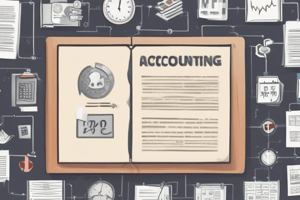Podcast
Questions and Answers
What is the primary purpose of accounting theory?
What is the primary purpose of accounting theory?
- To provide a framework for evaluating accounting practices (correct)
- To create detailed financial statements for businesses
- To describe forecasting methods used in accounting
- To establish the legal standards for financial reporting
Which of the following best defines measurement theory in accounting?
Which of the following best defines measurement theory in accounting?
- A framework to assess and interpret financial data (correct)
- A method for preparing budget forecasts
- A strategy to maximize profit margins
- An approach to improve investor relations
How does accounting theory contribute to the development of new practices?
How does accounting theory contribute to the development of new practices?
- By offering a structured set of regulations for compliance
- By providing guidelines that must be strictly followed
- By detailing historical accounting methods to follow
- By guiding the creation of new procedures through logical reasoning (correct)
Which example is most relevant to the concept of a conceptual framework in accounting?
Which example is most relevant to the concept of a conceptual framework in accounting?
What role does logical reasoning play in accounting theory?
What role does logical reasoning play in accounting theory?
What is a key characteristic of positive theories?
What is a key characteristic of positive theories?
What is a major criticism of normative theories?
What is a major criticism of normative theories?
Which statement best describes the goal of normative accounting theory?
Which statement best describes the goal of normative accounting theory?
What fundamental principle about theories is highlighted in the content?
What fundamental principle about theories is highlighted in the content?
What does the conceptual framework established in the 1980s aim to achieve?
What does the conceptual framework established in the 1980s aim to achieve?
In the context of accounting theories, what is meant by 'measurement using exit values'?
In the context of accounting theories, what is meant by 'measurement using exit values'?
What is a necessary quality of a good theory in accounting?
What is a necessary quality of a good theory in accounting?
What is a common result of competing theories in accounting?
What is a common result of competing theories in accounting?
What is the main benefit of having a theory in accounting?
What is the main benefit of having a theory in accounting?
Which of the following is NOT considered a purpose of accounting theory?
Which of the following is NOT considered a purpose of accounting theory?
What distinguishes positive theories from normative theories in accounting?
What distinguishes positive theories from normative theories in accounting?
Which accounting theory aims to address shortcomings and suggest improvements in practice?
Which accounting theory aims to address shortcomings and suggest improvements in practice?
According to Hendriksen's definition, what attributes are part of a theory?
According to Hendriksen's definition, what attributes are part of a theory?
What is one reason why partial or inaccurate theories can still be useful?
What is one reason why partial or inaccurate theories can still be useful?
Which of these theories primarily aims to describe and explain existing accounting practices?
Which of these theories primarily aims to describe and explain existing accounting practices?
Which statement best describes the function of logical reasoning in accounting theory?
Which statement best describes the function of logical reasoning in accounting theory?
Flashcards are hidden until you start studying
Study Notes
Accounting Theory
- A theory in accounting is often a description, explanation, or prediction of accounting practices.
- Theories are based on observations and logical reasoning.
- Accounting theory can be founded on a set of broad principles that provide a framework for evaluating current accounting practices.
- These principles guide the development of new accounting practices or procedures.
- Examples of accounting theory include conceptual frameworks and measurement theories.
What is Accounting Theory?
- A description, explanation, or prediction of accounting practices is based on observations and logical reasoning.
- A set of principles that provide a framework to evaluate accounting practices.
Why is Accounting Theory Necessary?
- Explains current accounting practices.
- Helps predict future accounting practices.
- Provides a basis for decision making.
Types of Accounting Theories
- Positive Accounting Theories
- Describe and explain current accounting practices as they are.
- Based on empirical observation and hypothesis testing.
- Normative Accounting Theories
- Suggest what accounting practices should be.
- Based on value judgments and observations.
Influence and Importance of Theories
- Theories influence real-world decisions, for example, in tax policy, interest rates, and education.
- Different accounting theories can provide different perspectives on an issue.
Examples of Accounting Theories
- Capital Market Theory - describes and explains current accounting practices within the context of capital markets.
- Agency Theory - predicts how accounting practices will be used in situations involving agency relationships.
- Conceptual Framework - provides principles for decision-making in accounting.
Recent Developments in Accounting Theory
- International Accounting Standards Board (IASB) and the Financial Accounting Standards Board (FASB)
- Working together to develop a single set of International Financial Reporting Standards (IFRS) for harmonized accounting practices.
- IFRS
- Emphasizes accounting practices that provide useful information for investors and other decision-makers.
- Includes principles for recognizing gains and losses in the periods they occur, and using exit values for measurement.
Studying That Suits You
Use AI to generate personalized quizzes and flashcards to suit your learning preferences.




